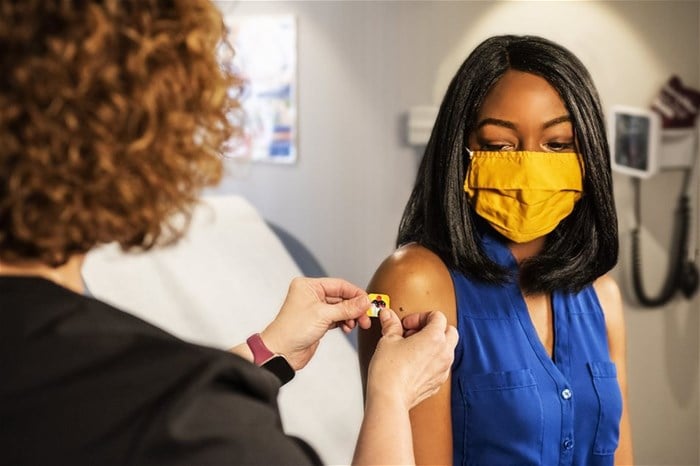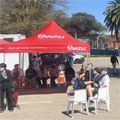Covid hub drives education and vaccination

Covid Hub – education for everyone
“At the outset of the pandemic, 18 months ago, we created an informative and educational Covid-19 hub to create a reliable source of information and to educate and empower our members,” explains Callakoppen. “The information includes helping identify symptoms, providing guidelines on how and where to be tested and receiving treatment.”
Recently, the fund enhanced and bolstered this centralised, digital Covid-19 information hub and made it accessible to all South Africans - www.bonitas.co.za/covid.
“As new scientific data became available, we continued to update the hub, highlighting key topics such as safety protocols, the different types of Covid-19 tests, dispelling myths around the vaccine and explaining the difference between Covid-19, the common cold and flu. One of the key elements is the comprehensive guide to recovering from Covid-19 which includes tips for caregivers, the do’s and don’ts of Covid-19 recovery, as well as post-Covid care tips.”
“Now, given the increased vaccination drive and it being opened to a wider group, we have further enhanced the site to assist our members with registration and help speed up the process at Bonitas vaccination sites.”
Private vaccination sites for all
To support the Department of Health’s ongoing efforts to vaccinate as many South Africans as possible, Bonitas had vaccinated over 100,000 South Africans at its private vaccination sites across the country by mid-July. A quarter of whom (25,245) were Bonitas members. At present, the 50+ age groups are being vaccinated, with registration and vaccinations for 35+ now open. The 10 sites adhere to all the required safety regulations and are staffed by qualified nurses, additional sites are due to come online in the next few weeks.
“As of 13 July 2021, there were 2,031 Bonitas members in hospital, compared to 1,893 the week before and 1,598 at the end of June,” says Callakoppen. “We have conducted a total of 338,981 PCR tests, 150,430 of these were between January and July 12th – with 28,097 members testing positive. This is a 44% increase over six months.
“However, studies have shown that once people are vaccinated, they’re far less likely to fall seriously ill and that the vaccine provides protection against hospitalisation for the Delta variant, which is why the vaccine roll out is critical.”
This aligns with the recent statement from Dr Marian van Kerkhove of the World Health Organisation (WHO): “The Covid-19 situation globally is dangerous with high levels of transmission driven by four major factors. The first are these variants of concern, including the Delta variant. The second factor is that we have increased social mixing and social mobility, which increases the number of contacts that individuals have. The third factor is the relaxation or the inappropriate use of public health and social measures. Proven public health and social measures that we know prevent infections, reduce the spread of somebody who is infected with the virus to others and save lives. And the fourth factor is the uneven and inequitable distribution of vaccines.”
Herd immunity
Vaccinating as many people as soon as possible remains a priority if we are to minimise the impact of Covid-19. To achieve herd immunity, the South Africa’s Department of Health is aiming to vaccinate 67% of the country’s population – this equates to around 41 million people.
“It’s heartening to learn that vaccine acceptance is growing in South Africa, with the latest Covid-19 study revealing that 76% of the population are willing to be vaccinated. Over 5.5 million doses have now been administered with just under two million South Africans having received both doses. This means 3% of the population is fully vaccinated. Plans are in place to ramp this up over the next few weeks, which will include sites being open over weekends and to widen the groups being vaccinated.
Educate and vaccinate
In collaboration with service providers and employer groups, the fund’s private vaccination sites also promote key Covid-19 messages, with take home educational leaflets that can be shared. “In addition, we have begun the process of opening vaccination facilities at major scheme employer sites, such as Eskom,” says Callakoppen. “We are continually engaging with corporates to improve the support we provide.”
Identified high-risk beneficiaries are also being supported through various initiatives, including disease management interventions, home-based care and medicine supplies where required.
QR code replaces forms
“Complaints about queues and waiting times at some sites have been taken into consideration,” says Callakoppen. “We have streamlined the process for members by providing access to a QR code, upon registration on the EVDS and our portal. This means that they are scanned upon arrival, eliminating any delay by having to fill in forms – allowing for a smooth and efficient process.”
Registration should still be done via the government website on https://vaccine.enroll.health.gov.za and everyone must remember to take along their unique token, ID document or passport to the vaccinations site. If you’re on medical aid, make sure you have your medical aid card with you.
“We need to remain on high alert about the pandemic,” warns Callakoppen. “We cannot afford to be complacent. We must all play our part to stay safe, which means following the protocols and getting vaccinated.
“The vaccination process is a key focus area for us, along with education. We will continue to use our Hub (available at www.bonitas.co.za/covid) as a central resource for factual information. A ‘go-to’ for help and advice as we learn to navigate around this pandemic.”
- When it’s not flu…02 Apr 14:37
- Shining the spotlight on TB24 Mar 15:32
- Transforming healthcare through partnerships18 Mar 10:58
- The Bonitas Top Broker Awards: Recognising partnerships and performance13 Mar 15:52
- Talking about cervical cancer and the HPV vaccine05 Mar 16:09
Related
ARB says complaint against Department of Health TV sugar ad holds merit 4 Apr 2025 When it’s not flu… 2 Apr 2025 Oral health is more than smiles: South Africa’s public health emergency 27 Mar 2025 Transforming healthcare through partnerships 18 Mar 2025 The Bonitas Top Broker Awards: Recognising partnerships and performance 13 Mar 2025 Talking about cervical cancer and the HPV vaccine 5 Mar 2025


























